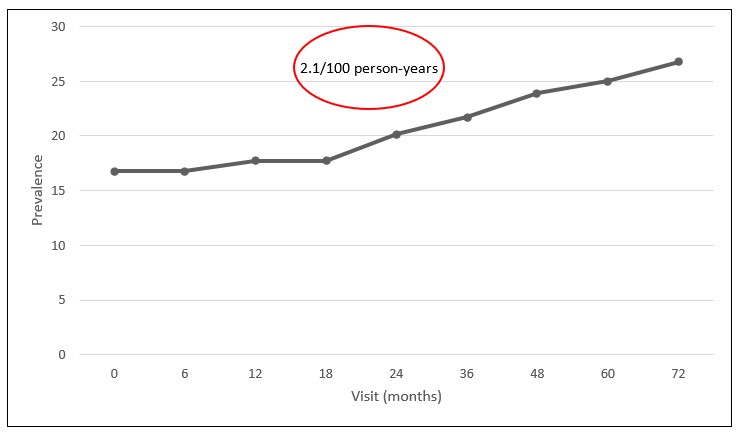Session Information
Date: Monday, November 8, 2021
Session Type: Poster Session C
Session Time: 8:30AM-10:30AM
Background/Purpose: Psoriasis is a frequent extra-articular manifestation in axial spondyloarthritis (axSpA) with a prevalence in established axSpA around 9% and consequences on the disease course. In recent axSpA, prevalence and consequences of psoriasis are unclear.
The objectives were to determine the prevalence and the impact of psoriasis in recent axSpA over 6 years of follow-up.
Methods: This was an analysis of the first 6 years of the French prospective cohort DESIR (NCT01648907) which recruited adult patients with inflammatory back pain for less than 3 years suggestive of SpA(4). Psoriasis was recorded at baseline and at each visit (once or twice per year) through the rheumatologist’s reporting. Functional assessment (HAQ-AS, BASFI) and disease activity were assessed at each time point. Cumulative prevalence of psoriasis at each time point and cumulative incidence were calculated. Baseline characteristics associated with cumulative psoriasis were assessed by univariable analysis. Patients with versus without psoriasis were compared at 5 years for sacro-iliac and spine SPARCC inflammatory score and at 6 years, for HAQ-AS, BASFI, ASDAS-CRP and MASES enthesitis index, in univariable then multivariable analysis adjusted on demographic variables and baseline values of each score. Patients with complete data for ASDAS-CRP at 6 years were included in this analysis. There was no imputation of missing data.
Results: After 6 years, 589/708 (83.2%) patients were followed-up: mean age 40.5±8.7 years, 45.8% men. The cumulative prevalence of psoriasis increased from 99/589 (16.8%) at baseline to 158/589 (26.8%) at 6 years (Figure), leading to an incidence of 2.1/100 patient-years. As expected, patients with psoriasis had more peripheral arthritis and a higher BMI at baseline. After 6 years of follow-up, for 343 patients with complete data, there was no significant impact of psoriasis on functional capacity (BASFI, HAQ), on disease activity (similar ASDAS-CRP score), enthesitis or MRI.
Conclusion: Psoriasis is frequent in early axSpA and is often concomitant to the diagnosis of axSpA. Over 6 years of follow-up, de novo psoriasis may be detected at any time point, necessitating regular work-ups. In this analysis, outcomes did not appear worse for patients with psoriasis than without. Further research to explore impact of psoriasis on axSpA is needed.
 Cumulative prevalence and incidence of psoriasis in 589 axial SpA patients over 6 years of follow-up
Cumulative prevalence and incidence of psoriasis in 589 axial SpA patients over 6 years of follow-up
To cite this abstract in AMA style:
LUCASSON F, Richette P, aouad k, RUYSSEN-WITRAND A, Wendling D, Fautrel B, Gossec L. De Novo Psoriasis Can Be Reported at Any Timepoint in Early Axial Spondyloarthritis: An Analysis of 6 Years of Follow-up of the DESIR Cohort [abstract]. Arthritis Rheumatol. 2021; 73 (suppl 9). https://acrabstracts.org/abstract/de-novo-psoriasis-can-be-reported-at-any-timepoint-in-early-axial-spondyloarthritis-an-analysis-of-6-years-of-follow-up-of-the-desir-cohort/. Accessed .« Back to ACR Convergence 2021
ACR Meeting Abstracts - https://acrabstracts.org/abstract/de-novo-psoriasis-can-be-reported-at-any-timepoint-in-early-axial-spondyloarthritis-an-analysis-of-6-years-of-follow-up-of-the-desir-cohort/
